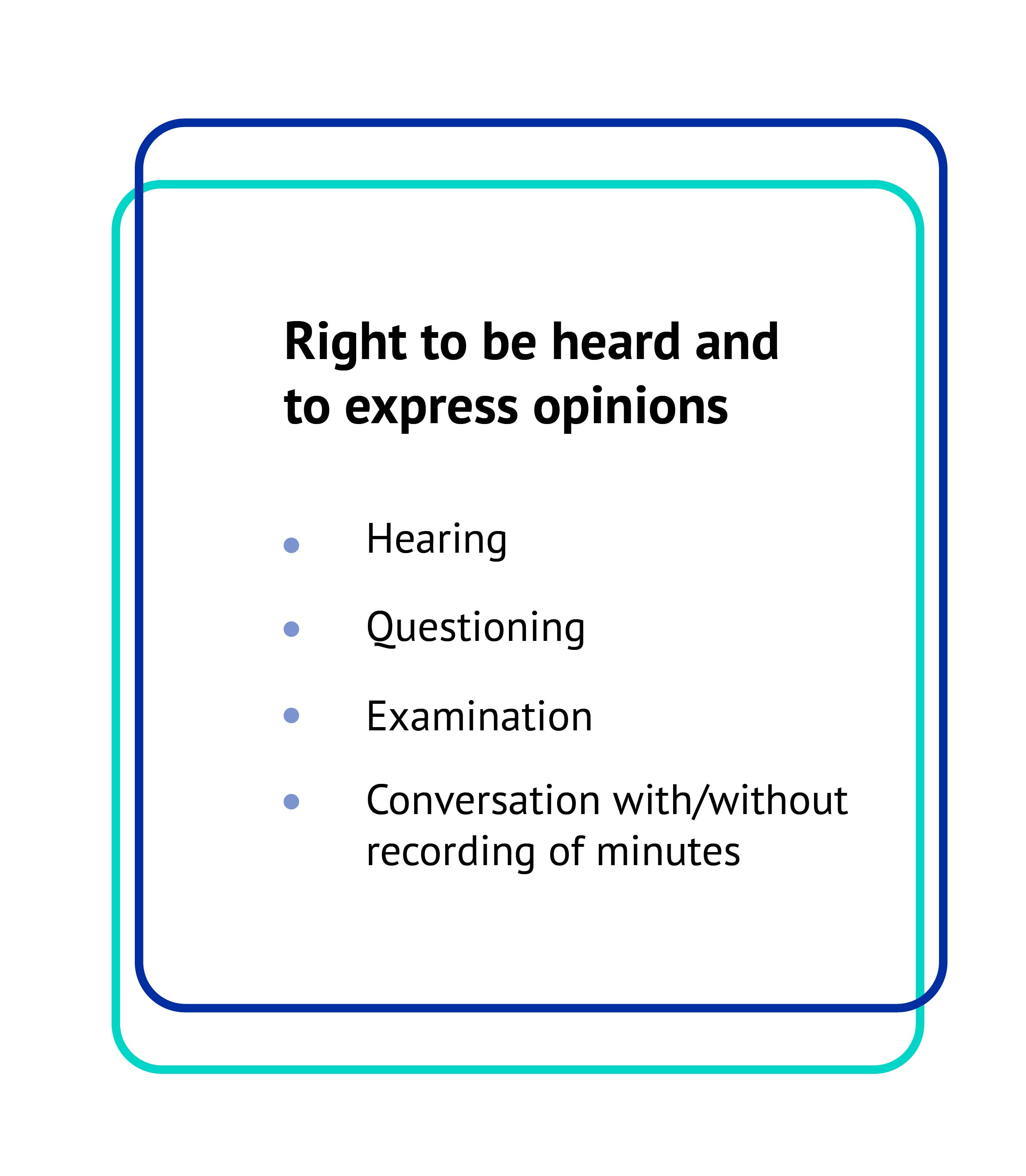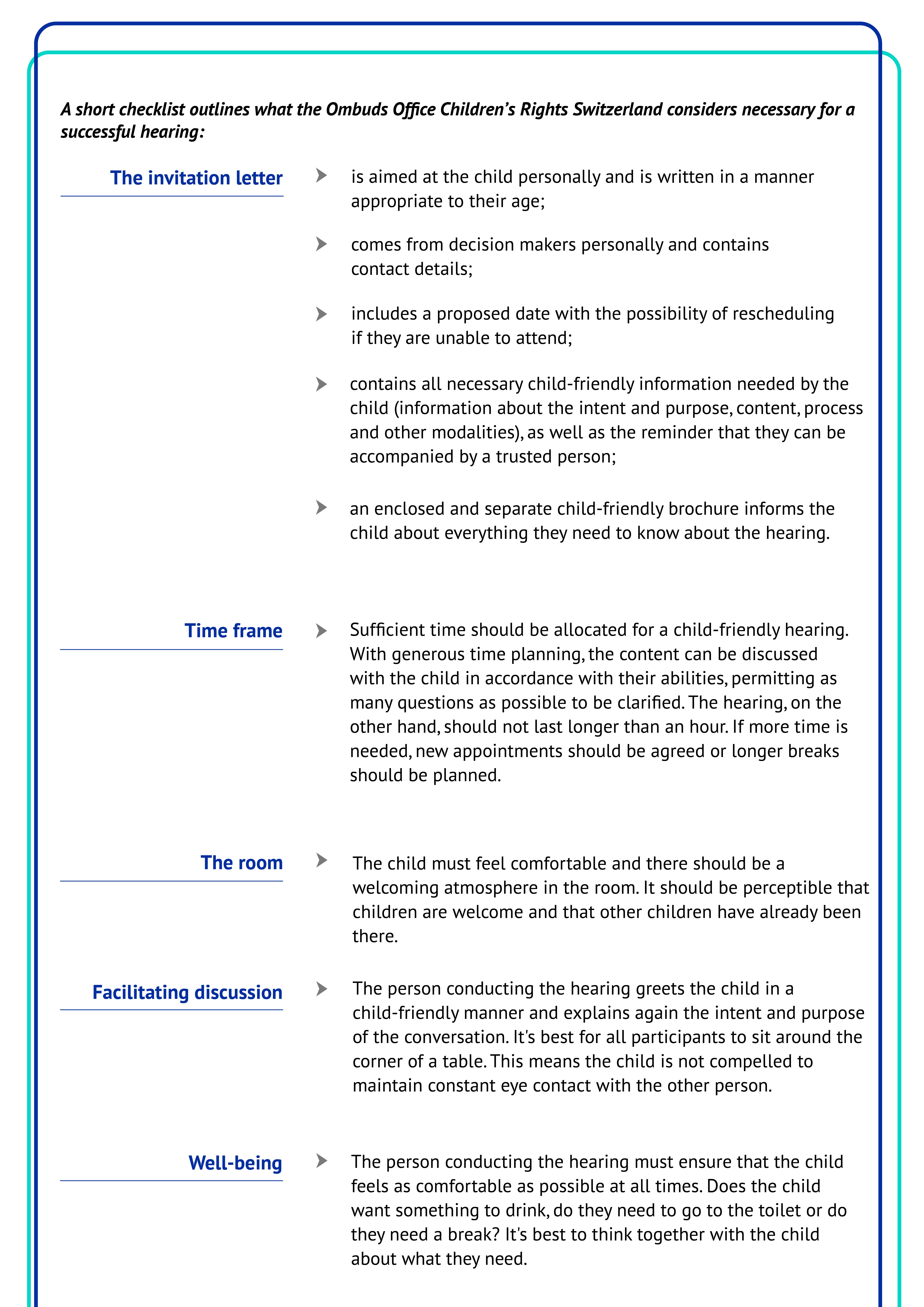The participation of the child is likewise the focus of the latest edition of “undKinder” magazine from the Marie Meierhofer Institute for the Child (MMI). Our guest article takes a detailed and comprehensive look at the topic from a legal perspective. We tackle the most important points of the article “Schutz des Kindes durch Partizipation” (Protecting children through participation) and present them to you over the course of three blog articles. In this third and final article, we would like to conclude with a discussion of the importance of child-friendly hearings.
As the national Ombuds Office Children’s Rights Switzerland, we ensure that minors have access to the legal system and to appeals mechanisms. We take action when a child contacts us on their own initiative. We inform the child about their rights and mobilise professionals locally to ensure that children’s rights are implemented.
Our normative framework is the guidelines of the Committee of Ministers of the Council of Europe for Child-friendly Justice and the UN Convention on the Rights of the Child:
For a child to be able to participate in legal proceedings, the first step must be to inform them – in a child-friendly manner – about their rights and about all of the upcoming processes. Responsible specialists and professionals must ensure that the child can comprehend what has already happened and what is planned to take place. This is essential in order to safeguard the second stage, in which the child expresses their opinions, wishes and concerns in the hearing.
Unfortunately, still today many children in Switzerland are not automatically accorded the right to participate, in particular the right to be heard, as illustrated by the following example of Elina and Eliza:
Advice example – divorce law
Elina (12) and Eliza (10) get in touch online with the Ombuds Office Children’s Rights Switzerland. Elina was given the tip by a fellow pupil. Their parents are going through an extremely acrimonious divorce. The sisters have learned that both their mother and father have applied for sole custody rights. In the divorce proceedings, Elina and Eliza were neither asked what they wanted nor were they informed about their rights. The girls feel bewildered, angry and desperate: Can adults really decide on their future in this way and without their participation?
In a telephone call, we informed the sisters about their rights, in particular that they have a right to be heard (a court hearing by a judge) and to legal representation. We also recommended them to contact the judge directly (by phone or letter) to request a hearing. They also applied for the appointment of legal representation. They had still not heard from the judge after several weeks and so they called us again requesting further support. They gave us permission to contact the judge directly. Following a intermediary discussion with the judge, a hearing was organised and the application for the appointment of legal representation was approved. In Elina and Eliza's case, several of their rights had not been applied: their right to be heard and to express their opinions, their right to information and to legal representation. The Ombuds Office Children’s Rights Switzerland played a key role in averting the consequences of the failure to hear the girls, namely decisions made by the court without knowledge of their will. In addition, we ensured that the children were represented in court.
Hearings – a central element of participation
In every proceeding that involves children, the main hearing or consultation is a central element of participation. A different term may be used for the occasion depending on the nature of the proceeding and the area of law:
 In general, however, the objective is the same: the child's right to express their subjective will. As illustrated by the example of Elina and Eliza, it cannot always be taken for granted that there will be an official opportunity to make their views heard. From a developmental psychology perspective, from around the age of six on average, children are capable of making their opinions and wishes known on matters that concern them, or can communicate them verbally to another person. However, this age limitation should not be applied rigidly but should be adapted to the child's level of development, and thought should be given to the formulation of the questioning. It is only permissible to waive hearings in exceptional situations, for example if it is established beyond doubt that the child cannot or does not want to exercise their right to be heard. As part of the invitation to the hearing/consultation, the child is informed that they can take participate in the ongoing decision-making process and are permitted to express their viewpoints on their situation. The invitation should motivate the child to participate in the process
In general, however, the objective is the same: the child's right to express their subjective will. As illustrated by the example of Elina and Eliza, it cannot always be taken for granted that there will be an official opportunity to make their views heard. From a developmental psychology perspective, from around the age of six on average, children are capable of making their opinions and wishes known on matters that concern them, or can communicate them verbally to another person. However, this age limitation should not be applied rigidly but should be adapted to the child's level of development, and thought should be given to the formulation of the questioning. It is only permissible to waive hearings in exceptional situations, for example if it is established beyond doubt that the child cannot or does not want to exercise their right to be heard. As part of the invitation to the hearing/consultation, the child is informed that they can take participate in the ongoing decision-making process and are permitted to express their viewpoints on their situation. The invitation should motivate the child to participate in the process
Strength through participation
From a psychological perspective, it is extremely valuable for children to be able to bring their own subjective will and desires into important decision-making processes. A child’s development – particularly in stressful situations – depends on how well they can understand what is happening around them. An open conversation can offer a measure of relief, especially for insecure or frightened children. The information they receive allows them to make sense of their impressions, grasp their situation and prepare better for planned changes. Experiencing and recognising one’s own effectiveness is also positive. In stressful situations, children are strengthened when they recognise that what they say or do has an impact and is considered valuable. It is also vital that children in significant situations encounter people who care sincerely for their well-being and are genuinely interested in them.

Support for professionals
Do you have any questions about the topic of “Hearings involving children and young people”? Or are you interested in professional development in this area? Please don't hesitate to contact us – we will be happy to advise you. Please also take note of the professional development and vocational training offers on our education portal. Furthermore, we encourage you to make children and young people in your private or professional environment aware of our free advisory services. You can find out more about protecting children through participation in our in-depth article in the latest issue of “undKinder” magazine from the MMI – Marie Meierhofer Institute for the Child.

Our flyer for children and young people
Such professionals include child and youth representatives, social workers, CAPA employees, judges, public prosecutors and youth prosecutors, legal child representatives, victim support advisers, assessors, mediators, therapists, school social workers, prison employees, police officers, teachers, migration specialists, doctors, sports directors, foster parents or employees of children’s homes, and others.

Marie Meierhofer Institute for the Child
The Marie Meierhofer Institute for the Child (MMI) is a recognised institute for early childhood. The institute is occupied with the preconditions for successful development and the prevention of problematic developmental processes.
The MMI is working at the interface of developmental psychology, early childhood education and familial-sociological expertise, and combines practice and research in a multi- and transdisciplinary approach.
The MMI is an associated institute of the University of Zurich.










